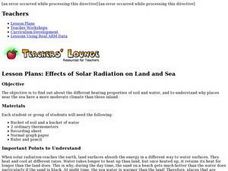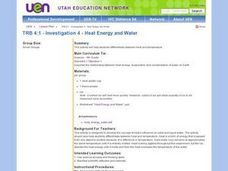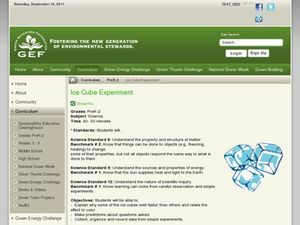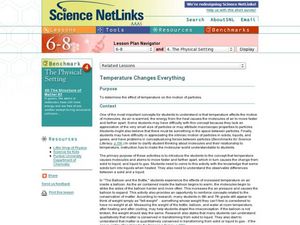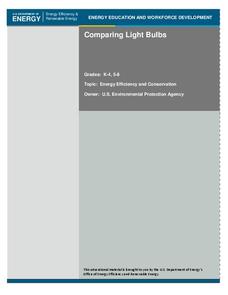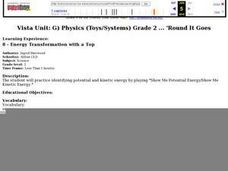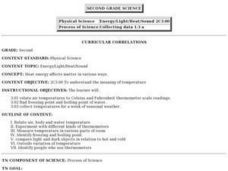US Department of Energy
Effects of Solar Radiation on Land and Sea
Earth science enthusiasts experiment to compare the heating rates of soil and water. They relate their findings to the weather conditions near bodies of water. Consider also having middle schoolers measure the cooling rates to...
Texas State Energy Conservation Office
Nuts! Calculating Thermal Efficiency
Oh nuts! Do macadamias or almonds produce more thermal energy? Energy enthusiasts find out with this experiment. The objective is to demonstrate to your class how the chemical energy contained in foods can be converted into useable...
Virginia Department of Education
Heat Transfer and Heat Capacity
It's time to increase the heat! Young chemists demonstrate heat transfer and heat capacity in an activity-packed lab, showing the transitions between solid, liquid, and gaseous phases of materials. Individuals plot data as the changes...
It's About Time
Energy Flow in Ecosystems
Emerging biochemists more fully understand the flow of energy in ecosystems as they explore the laws of thermodynamics and relate them to energy transfer in food chains. They also investigate heat loss from the human body and how...
Institute of Electrical and Electronics Engineers
Solar Structures
It's time to soak up the sun! Youngsters read about active and passive solar heating systems, then they collaborate to create a miniature solar-heated building. Provide a variety of materials for them to incorporate and watch their...
Teach Engineering
Energy in Our Lives Carousel
Don't waste any more energy trying to find a great resource on energy. The third installment of a 25-part Energy Systems and Solutions unit focuses on energy use in pupils' lives. They consider how their daily routines consume energy and...
Curated OER
Heat Energy and Water
Fourth graders brainstorm the differences between heat and temperature. In groups, they determine the best way to melt ice without touching the ice. They record their observations and compare them with other groups. To end the lesson...
Curated OER
Ice Cube Experiment
Students explore the rate at which ice melts. In this science lesson, students place ice cubes on colored index cards and place them in direct sunlight. Students observe which ice cubes melt fastest and slowest.
Curated OER
Heat - A Form of Energy
Middle school or high school physical science pupils will warm up to the topic of heat when viewing this set of slides. It covers heat transfer, measurement tools, phase changes, and more. Have demonstrations and examples of the tools...
American Chemical Society
Preparation and Combustion of Biodiesel
The United States is the world's largest producer of biofuel. During an in-class investigation, young scientists produce their own biodiesel. They burn a sample of it to determine the heat of combustion. Then they discuss the results...
Curated OER
Black and White Bottle Experiment
Students investigate solar energy and color. In this solar energy lesson plan, students assess the benefits of solar energy. Students discover that solar energy is attracted to darker colors and conduct an experiment using colored...
Curated OER
Urban Heat Islands: An Introduction to Energy Transfer and Transformation
Elementary school physical scientists explore kinetic mechanical energy by dropping a golf ball on different surfaces. They discuss how human made materials might react to light differently from nature made materials. This lesson plan...
Curated OER
Temperature Changes Everything
Middle school chemists visit interactive websites in order to discover what happens to molecular motion when heat is added to matter. They conduct an experiment that demonstrates the expansion of matter with the addition of heat. A lab...
American Chemical Society
Changing the Density of a Liquid - Heating and Cooling
During a unit on density, pupils ponder whether or not temperature affects this property. By carefully inserting blue cold water and yellow hot water into a room-temperature sample, they will see the answer. Make sure to have done the...
Curated OER
Comparing Light Bulbs
An average home produces twice as many emissions as an average car. Teach your class how to reduce energy consumption by replacing standard incandescent light bulbs with compact fluorescent light bulbs. Perform an experiment to compare...
Curated OER
Thermal Energy
Explore thermal energy with your class with this introductory presentation. While there is information about heat, conduction, temperature and other topics, further information could be added to make it a richer experience.
Curated OER
Energy Transformation with a Top
Second graders examine both potential and kinetic energy. After discussing the difference and examples of potential and kinetic energy, they participate in a game of "Show Me Potential Energy/Show Me Kinetic Energy" using toy tops.
Curated OER
What is Energy?
Youngsters take a look at the foods they eat, and how they provide energy for them to do things. They look at how body uses the food energy to create movement. Pupils also look at toys/devices in the room that need electrical energy...
Curated OER
Energy Transformation with Balance Toys
Students explore and identify the concepts of potential and kinetic energy. They define kinetic and potential energy and discuss examples of each. Students then play a game involving balance toys, demonstrating both kinetic and potential...
Curated OER
Energy Transformation with Simple Machines
First graders identify both potential and kinetic energy in a game they play in the classroom. They listen as the teacher explains the difference between potential and kinetic energy when observing a simple machine. Using simple...
Curated OER
Heat Energy- Temperature
Second graders investigate the meaning of temperature. They determine what happens to a thermometer when the temperature rises or falls. They place thermometers in different classroom locations in order to compare the temperature in a...
Bonneville
Making the Standard Solar Heater
Heat up a lesson on solar energy. The first of three parts in the Experimenting with Solar Heaters unit has scholars construct solar heaters. They then use them to heat up a container of water and calculate the amount of heat energy...
Texas State Energy Conservation Office
Investigation: Insulation
Youngsters compare the heat-holding abilities of three different cans by insulating two with different materials and measuring the temperature change of hot water over a 20-minute period.
It's About Time
Exploring Energy Resource Concepts
Please turn off the lights to conserve energy. Or not, after all energy is always conserved. This first lesson in an eight-part series includes three parts. Part A contains one hands-on activity and two inquiry-based experiments on heat...


